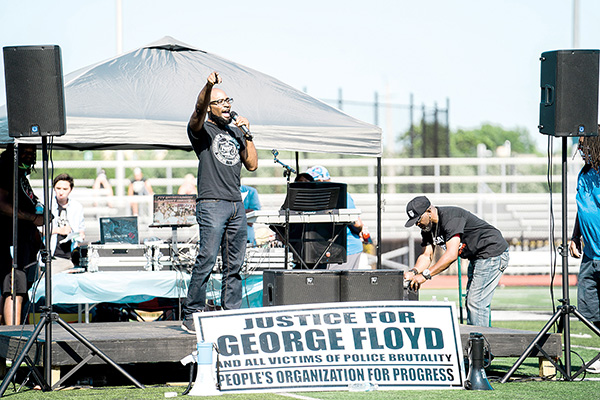
By Allison Perrine
RED BANK – The NAACP of Greater Red Bank has seen a “dramatic spike” in interest amid the ongoing Black Lives Matter movement sweeping the state, country and globe, representatives told The Two River Times.
According to president Kerwin Webb, the local National Association for the Advancement of Colored People (NAACP) chapter has doubled its mailing list in the past two weeks. Members have been asked to speak at multiple events to explain the message of systemic racism in America and the struggles faced by people of color. And it certainly won’t stop there, he said.
“I don’t believe that this goes away without significant change,” said Webb. He added that police brutality and systemic racism have been around for centuries, but most people are unaffected by it. “Now there’s no way to really put our heads in the sand anymore,” he said. “People have been confronted with the reality of the system that we live in and are being called on it.”
The NAACP emphasizes five major issues in its communities – education, health, climate, criminal justice and housing. The Red Bank chapter focuses on education. Throughout the year, members work to make students more aware of all American history, “not just the selected parts that are generally in most curriculums,” said Webb. They also tutor people on different topics including voter registration, the U.S. Census and more.
In the past, the chapter has offered scholarships to keep young people engaged in the NAACP and its work. But in recent years members haven’t been able to do so. There hasn’t been much interest in the work of civil rights lately, said Webb. He and others are hoping that changes now. Part of that change will come with continued education and showing residents that the mistreatment of Black Americans does not just stem from the South. It could have happened right in your backyard.
In a piece written in 1999 by Gary Saretzky, former Monmouth County archivist, in 1886 a 66-year-old Black man named Samuel Johnson was lynched in Eatontown. Nicknamed “Mingo Jack,” Johnson had been accused of raping a 24-year-old white woman named Angelina Herbert. She had been raped in the woods near Whale Pond Brook, south of Eatontown, on her way to visit a friend, according to Saretzky.
Mingo Jack was born into slavery on a farm of Samuel Laird in Colts Neck in about 1820 and was likely freed in 1845, Saretzky wrote. He worked as a “rubber” at the Monmouth Park stables. He was arrested in 1886 at home and “calmly expressed ignorance of the crime” when he learned of the charge, according to Saretzky. A mob of possibly 75 men attempted to shoot Mingo through the window of the jail three times but were unsuccessful. That’s when they broke into the jail, beat him badly and lynched him in the doorway of the jail, according to the article.
Now, the NAACP is working with the Equal Justice Initiative (EJI) from Montgomery, Alabama, to make residents aware that this history is living in their backyards. So far, the EJI has found evidence of over 4,000 lynchings through this project, Webb said. He hopes the information can help start difficult conversations that need to happen.
“A lot of people want to do right, want to help, be positive, but they don’t know how to have the conversations or they’re afraid” to say the wrong thing and make matters worse, said Webb.
In the Two River area, several local organizations are working with the NAACP to help spread the word and to work toward equality and justice. That includes the T. Thomas Fortune Foundation, Brookdale Community College, Monmouth County Historical Association, Pilgrim Baptist Church and Citizens for a Diverse and Open Society.
Past and present members of the NAACP, Monmouth Reform Temple, T. Thomas Fortune House and Monmouth County Correctional Facility came together June 30 for a virtual discussion about racism. Organized by the Red Bank Public Library, the first Let’s Talk About Race program was titled “Conversations for Our Times.”
It’s important to share resources and ideas with other groups with the same goals, Webb said. One thing all civil rights workers and activists know is there’s usually not enough people to do all of the work that must be done, he said. That’s why they are collaborating to better educate the greater Red Bank area.
“It’s almost like the snowball has started, and if people aren’t paying attention they’ll get caught up in it unaware,” said Webb. “This is really the battle for our nation.”
The article originally appeared in the July 2 – 8, 2020 print edition of The Two River Times.














